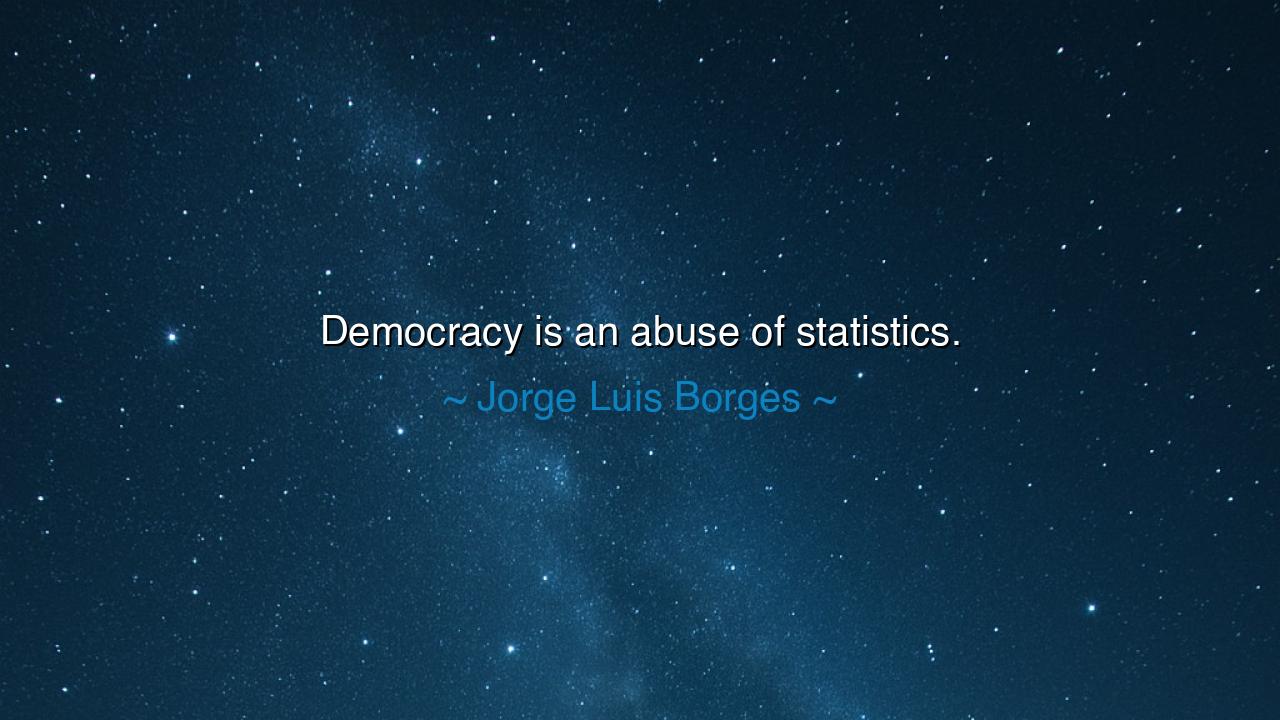
Democracy is an abuse of statistics.






“Democracy is an abuse of statistics.” — thus spoke Jorge Luis Borges, the Argentine sage whose words shimmer like a mirror that reflects both truth and irony. In this phrase, Borges did not condemn the spirit of liberty, nor mock the dream of equality. Rather, he unveiled a profound lament: that when democracy, the noblest creation of the human mind, is reduced to mere numbers — to statistics — it loses its soul. It becomes a game of arithmetic, where hearts are counted but not heard, and the sacred judgment of wisdom is drowned in the clamor of the multitude.
In the ancient world, philosophers feared this very danger. Plato, in his dialogues, warned that when a people confuses the will of the majority with the will of the wise, the city falls into ruin. He saw that numbers, though precise, cannot measure virtue. For virtue belongs to the few who see clearly, while statistics belong to the many who merely count. Democracy, when divorced from thought, becomes a tyranny of opinion — a kingdom of noise where truth is voted upon, and wisdom is outnumbered. Borges, in his timeless way, reminded us that to equate righteousness with the greater percentage is to abuse the very essence of human judgment.
Look to history, and you will find this lesson written in flame. In ancient Athens, the birthplace of democracy, there came a day when the people — stirred by passion, blinded by rumor — voted to execute Socrates, the very man who had taught them to think. The majority spoke; the statistics were clear. But what justice was in that number? The people believed they defended their freedom; in truth, they destroyed their conscience. Thus, the city that had given birth to reason was undone by the abuse of statistics — by the belief that truth can be counted, rather than understood.
Borges, a poet of paradox, saw that modern societies often make the same mistake. He watched as nations boasted of elections and percentages, as if the highest vote were proof of moral superiority. But to him, statistics were a cold god, incapable of discerning truth from deceit. What is a million voices if they all echo falsehood? What is a 90% approval if it worships a lie? Numbers may show the will of the people, but they cannot measure the wisdom of their choice. For the heart of democracy is not counting, but conscience — not quantity, but quality of thought.
Yet, this quote is not a call to despair. It is a warning — a torch held up against the gathering fog of conformity. Borges invites us to remember that democracy, if it is to live, must be more than a poll or a percentage. It must be an act of the soul — a continual striving toward truth. The ballot must be guided not by passion or pride, but by discernment, humility, and a reverence for wisdom. For when we choose leaders or ideas, we are not playing with numbers — we are shaping destiny itself.
Consider the story of Abraham Lincoln, who governed not by numbers alone but by moral vision. In his time, the winds of the people were divided; half the nation cursed his name. By statistics, he was often in the minority. But his heart was anchored in justice, and his wisdom pierced beyond the crowd’s blindness. Had he ruled by numbers, slavery might still have endured. But Lincoln knew that truth is not a matter of majority, and righteousness is not up for vote. In him, democracy was redeemed — not as an abuse of statistics, but as a triumph of principle.
Therefore, let this teaching pass to you, my listener, as flame from an ancient lamp: do not worship numbers. In your life, in your community, in your nation, seek not what is popular, but what is true. Question the comfort of the crowd; weigh your choices not in the scales of approval, but in the scales of conscience. For the greatest danger of democracy is not tyranny from above, but blindness from within — when men and women forget that wisdom cannot be measured, and truth cannot be tallied.
So, walk with courage and discernment. When you cast your vote — for leaders, for ideas, for the kind of person you wish to be — do so as one who remembers Borges’s warning. Let your reason be your compass, your conscience your guide. For in the end, it is not the statistics that define a nation’s soul, but the integrity of its people.






AAdministratorAdministrator
Welcome, honored guests. Please leave a comment, we will respond soon